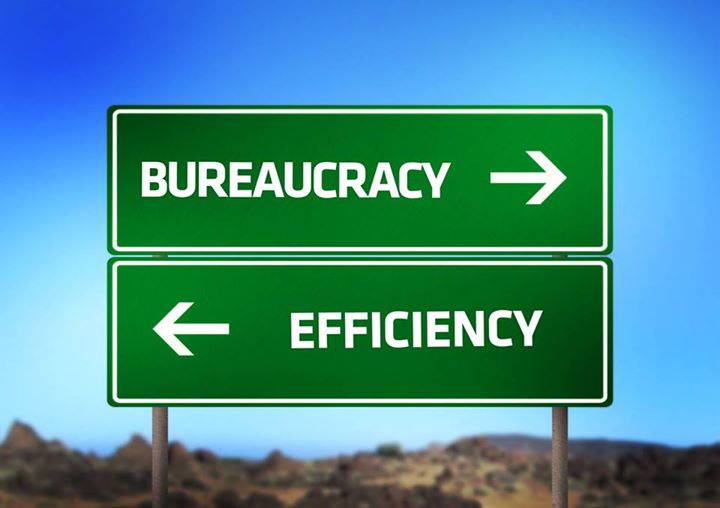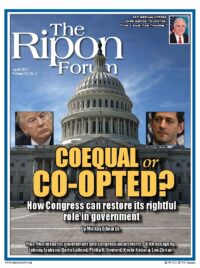
Americans think Washington is broken. That’s why they elected a tough-talking outsider as president. But fixing Washington requires more than one person; it requires a new operating system that allows people to make sensible choices. The parties can disagree about the size of government, but we should all agree that, whatever its scope, government should be responsive and give taxpayers their money’s worth.
What drives Americans crazy, I believe, are the nonstop idiotic dictates. Doctors spend half the day filling out forms no one reads. Factories and nursing homes get fined for inadequate paperwork, not unsafe conditions. It takes a decade to fix a broken bridge. Common sense is nowhere. Each choice must fit a preset mold. There’s little room for balance, or practical exceptions. Recently the University of California, Berkeley was compelled to remove 20,000 lectures from a free, online archive because it didn’t provide captions for the deaf.
Washington is an obsolete machine which churns out rigid, one-size-fits-all regulatory dictates. Day to day, no one in Washington is allowed to make sensible decisions. Fairness is irrelevant. Even relevance is irrelevant. Traffic studies were required for the replacement Tappan Zee Bridge even though the traffic flow is not changing.
Regulatory reform is desperately needed.
But what does that look like?
Amputating stupid programs is not sufficient. All programs, even the most worthwhile, are broken. All statutes, most written decades ago, have unintended consequences. The more specific the statutory and administrative dictates, the more they shackle common sense solutions. Environmental review is a sensible idea, but spending years writing 5,000 page tomes actually harms the environment by prolonging polluting bottlenecks. Special education is needed, but should it consume more than 25% of the total K-12 budget?
Washington is an obsolete machine which churns out rigid, one-size-fits-all regulatory dictates.
What’s missing is pretty basic: No official has the ability to draw the line, or to balance different needs, or to honor timing constraints. Sensible decisions are usually pretty obvious. “Oh, you’re just raising the roadway of the Bayonne Bridge using the same foundations? Just give me 50 pages on construction impacts.” (That environmental review was 20,000 pages).
Americans are angry not just because Washington is too fat, but because it’s so stupid. The failure is imbedded in the idea that government can be a machine. Indeed, the operating philosophy of government is that regulation should be mindless compliance. That’s why rulebooks are a thousand pages, when the Constitution is only 15 pages. Of course Washington drives Americans nuts — it not only tells people what to do, but dictates exactly how to do it. Red tape is endless. What is the bureaucrat’s explanation for every idiocy? The rule made me do it.
What replaces red tape? People.
Human responsibility is the only alternative to mindless bureaucracy. Law can set goals and provide guiding principles, but common sense is impossible unless people — both officials and citizens — have the freedom to use their judgment at the point of implementation. This is our choice: Either regulate by central planning, with dense dictates, or regulate by letting people take responsibility to achieve results, with clear lines of authority and accountability to deal with disputes.
Restoring human responsibility has instant benefits. Daily choices can be practical again. For example, “There’s no need to do a traffic study if the new bridge has the same capacity as the old one.” Dense rulebooks will fall away like dry scales, and be replaced by pamphlets setting goals and guiding principles. Business managers and factory foremen will have room to tell their side of the story. The discussion will focus on what’s sensible, not mindless compliance with thousands of rules that make no sense in context. Disagreements will be resolved up a clear chain of authority.
Civil servants must be accountable.
Responsibility, however, requires a critical element essential to all functioning organizations — accountability. No one will give officials flexibility to use common sense unless they are accountable when they fail or are mean-spirited. Now we get to the link between regulatory reform and civil service reform
Accountability is basically nonexistent for federal civil servants. Job performance is irrelevant. Indeed, more people die on the job than are terminated or demoted. Periodic stories emerge of employees who cannot be terminated despite outrageous behavior — such as the EPA employee who spent the day surfing porn sites.
What replaced accountability was red tape. Everyone, including civil servants themselves, are suffocated by endless rules which dictate how to do everything. That’s why top college graduates avoid government careers like the plague.
Accountability is basically nonexistent for federal civil servants. Job performance is irrelevant. Indeed, more people die on the job than are terminated or demoted.
A historical halo hovers over civil service because it replaced the spoils system, in which public jobs were handed out to political hacks. As originally designed, in the Pendleton Act of 1883, civil service was a system of neutral hiring. As reform leader George William Curtis said, “if the front door [is] properly tended, the back door [will] take care of itself.” Civil service did not diminish the president’s power to manage or fire federal employees (other than barring demands for campaign contributions), because that was considered unconstitutional by the Attorney General.
But the “merit system” was turned upside down in the 1960s, when collective bargaining and a new theory of due process put the burden on public managers to prove in a legal trial any adverse personnel decision, even a negative comment in a personnel file. It’s no coincidence that a 2016 GAO report found over 99% of civil servants were rated “fully successful” or better. Terminating a civil servant is so difficult that almost no one tries.

The absence of individual responsibility is why Washington’s public culture is dispiriting. The accountability vacuum has removed the oxygen of purpose and replaced it with stale resignation. The 1989 Volcker Commission report found that seven of 10 public employees who witnessed fraud, abuse or waste did not even bother to report what they saw. It’s organizational psychology 101: “When a single individual free rides,” as one study found, there is a “precipitous decline in teammate contributions.” The second Volcker Commission, in its 2003 report, found deep resentment at “the protections provided to those poor performers among them who impede their own work and drag down the reputation of all government workers.”
Democracy itself can’t work when the chain of accountability is broken. Why don’t problems get fixed with new leaders? One reason is that civil servants just keep doing things the same way. They have an acronym for how they deal with incoming administrations: Webehwyg (pronounced We-be-wig) — “We’ll be here when you’re gone.”
Nothing works as it should when, instead of taking responsibility to get things done, public employees are trained just to trudge through the compliance manuals. The one certainty is that it doesn’t matter what they do.
Civil service, once the cure for good government, has become a cancer killing good government. Two Volcker Commissions and others have called for overhaul. In 2014, the Partnership for Public Service issued a report describing civil service as “a relic of a bygone era,” and called for “a new civil service framework,” including ending the presumption of lifetime careers.
Past efforts at reform in Congress, however, have withered in the face of union power and public indifference. Democracy seems to be in a death spiral of paralytic regulatory mandates – but no one will give officials the freedom to exercise common sense because civil servants are unaccountable. How do we pull out of the spiral?
The Constitutional Lever.
There’s a more direct path to accountability than wrestling with public unions. The president could repudiate civil service, in its current form, as a violation of the Constitution’s mandate that “The executive power shall be vested in a President…”
Executive power is toothless, as James Madison observed, if the president has no practical authority over personnel: “If any power whatsoever is in its nature executive, it is the power of appointing, overseeing, and controlling those who execute the laws.” Taking away the president’s power over executive employees is synonymous with removing the president’s executive power altogether.
Executive power is toothless, as James Madison observed, if the president has no practical authority over personnel.
The constitutional question is this: Does Congress have the power to tell the president that he cannot terminate inept or insubordinate employees? The answer, I believe, is self-evident. By executive order, the president could scrap the civil service system and replace it with a framework more compatible with reform proposals such as the one proposed by the Partnership for Public Service.
The triumph of public unions in securing invincibility from accountability turns out to be their weakness. By disempowering the nation’s chief executive from exercising one of his main constitutional prerogatives, they have opened the door for the president to assert his rights by executive order—not only to remake the civil service system, but also challenge Congress’s legislative mandate (in the Civil Service Reform Act of 1978) imposing collective bargaining on the executive branch. Public unions, we now know after a half century of experience, do not advance the public good. They have succeeded mainly in destroying any concept of merit in the merit system.
An executive order repudiating Congress’s personnel shackles will result in a constitutional challenge, which ultimately will be resolved by the Supreme Court. That’s why it’s preferable for Congress to use the prospect of unilateral executive action as the lever to redesign civil service in a framework consistent with legitimate goals—a new civil service system which honors principles of neutral hiring and is designed to foster a culture of excellence.
America needs to remake government for the 21st century. The only path forward is to return to constitutional first principles and create a civil service system that will serve the American people. Restoring accountability will not only transform Washington’s public culture, but will unlock the door to real regulatory reform.
Philip K. Howard chairs Common Good, which advocates common-sense reforms of law and government. He is the author of several books, including The Rule of Nobody (2014) and The Death of Common Sense (1995).




